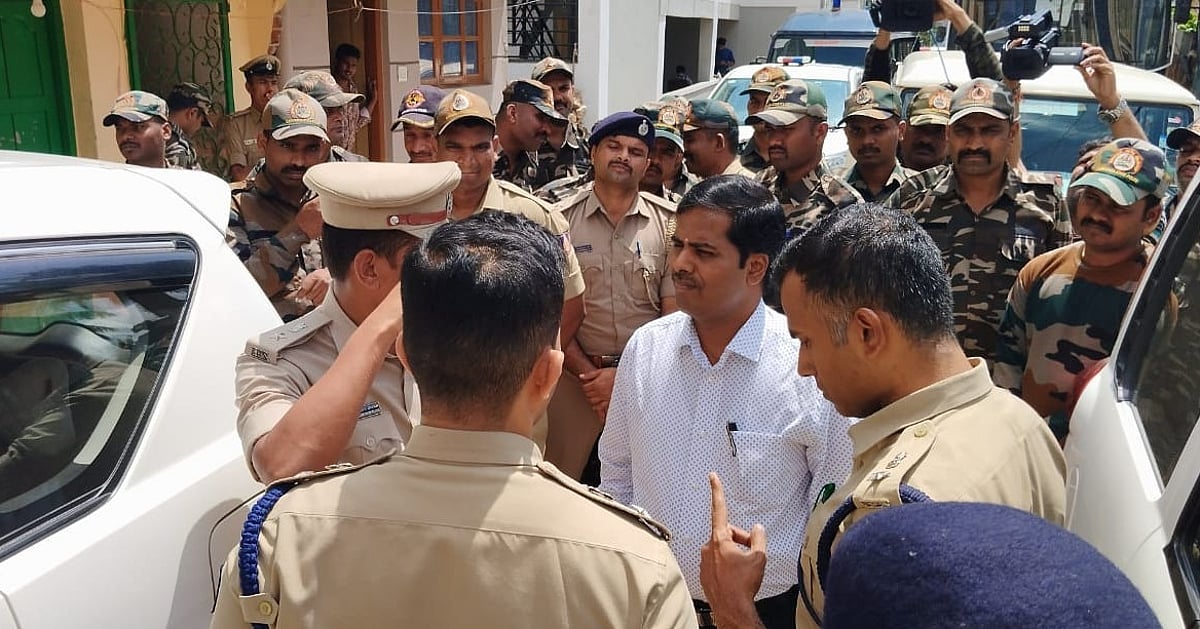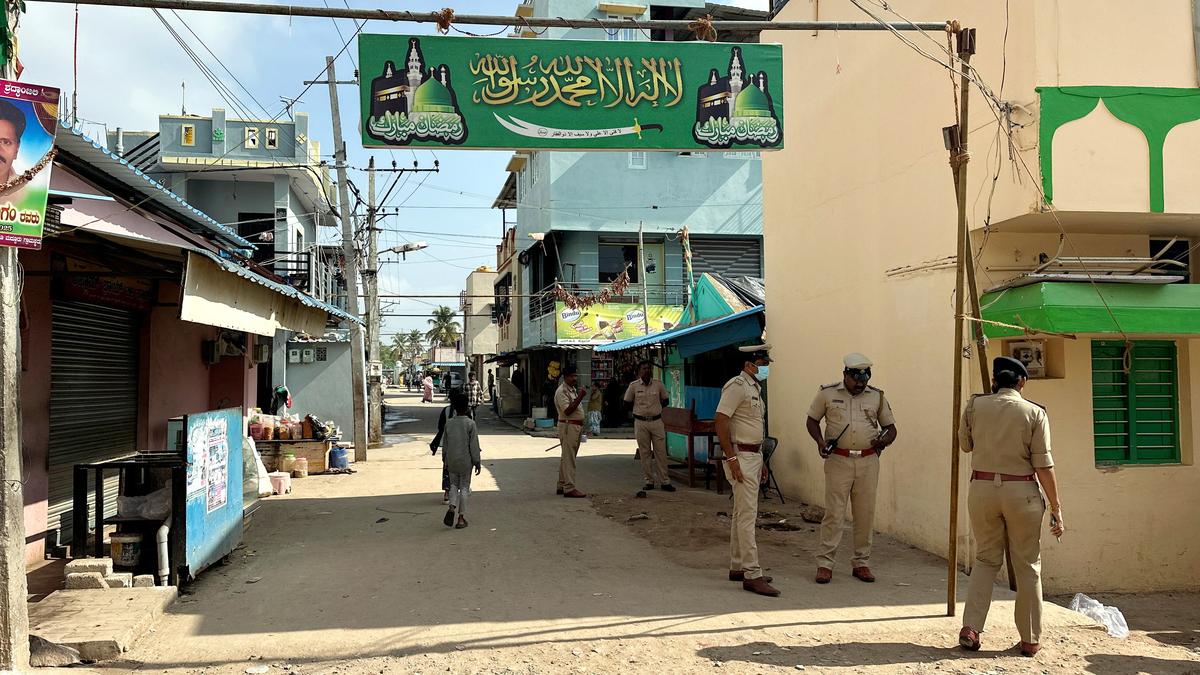Authorities in Maddur, Mandya district, have extended prohibitory orders under Section 144 of the Criminal Procedure Code in response to rising tensions and a bandh call given by local groups. The decision comes after incidents of unrest that disrupted public life and raised concerns about the safety of residents. The orders, which ban public gatherings, rallies, and processions, will remain in place for an additional seven days. Security forces have been deployed in large numbers, with additional reinforcements from neighboring districts to ensure peace and prevent any untoward incidents in sensitive areas.
The prohibitory orders have brought life in Maddur to a cautious standstill, with markets, schools, and transport services witnessing disruptions. Business owners expressed concerns about mounting financial losses, especially those dependent on daily trade and transport. Authorities emphasized that the restrictions are necessary to avoid escalation and to protect both life and property. The bandh call by certain organizations has further heightened anxiety among residents, many of whom fear clashes if the protests are not effectively controlled. Police officials have assured strict monitoring of movement in and around Maddur, with check posts set up on major roads.

Political leaders have weighed in on the issue, blaming each other for failing to maintain peace in the region. Opposition parties accused the ruling government of ignoring early warning signs and allowing the situation to deteriorate, while the government defended its measures as timely and preventive. Citizens, however, are demanding long-term solutions, insisting that frequent prohibitory orders disrupt livelihoods and create a climate of insecurity. The administration has urged people to cooperate with law enforcement, assuring them that peace will be restored soon if rules are followed diligently.
Community Concerns and Political Impact
Residents of Maddur have expressed deep frustration with repeated disruptions to their daily lives. Shopkeepers worry that continuous restrictions will discourage customers and affect essential supplies. Students preparing for examinations have also complained about the uncertainty, as schools remain closed and movement is restricted. Families dependent on daily wages are particularly hard hit, with no clear timeline for resumption of normalcy. Local organizations have requested the administration to find a balance between maintaining order and allowing essential activities to continue, stressing that prolonged restrictions could worsen public resentment.
The political implications of the extended prohibitory orders are significant. Leaders from various parties are closely monitoring the situation, with some accusing the government of using prohibitory orders as a tool to suppress dissent rather than as a genuine measure of public safety. The bandh call, meanwhile, is being seen as a test of political influence in the region. Analysts believe that how the government handles the situation in Maddur could have broader consequences for public perception, especially with upcoming elections. Public patience is wearing thin, and both state and district administrations are under pressure to restore calm swiftly.
The extension of prohibitory orders in Maddur has cast a shadow over the district’s economic and social life. Traders in the main markets lamented that frequent closures have drastically reduced their income, especially for those dependent on perishable goods. Vegetable and fruit vendors complained that unsold stock is rotting, leading to heavy losses. Transportation of goods has also been hampered, affecting farmers who rely on timely delivery to urban centers. Many residents argue that while safety is important, the repeated imposition of Section 144 highlights a failure to resolve deeper issues fueling unrest in the region.
Students and educational institutions are among the worst affected by the prolonged restrictions. Schools and colleges have remained closed for days, creating uncertainty over exams, projects, and academic schedules. Parents worry that the disruption could impact the learning outcomes of their children, especially those preparing for board examinations. Teachers have attempted to provide online lessons, but connectivity issues and lack of digital access in rural areas have made it difficult. Education activists argue that students should not repeatedly suffer because of political or communal disturbances and call for a dedicated framework to ensure continuity of learning.
The bandh call has also caused widespread anxiety about law and order in Maddur. Residents fear that even peaceful demonstrations could escalate into clashes between groups or with the police. Memories of past incidents of violence remain fresh in the minds of many locals, making them wary of stepping out unnecessarily. The heavy police presence, while reassuring to some, is seen by others as a sign of deep-rooted instability. This environment of fear has discouraged normal social interactions and gatherings, leaving communities feeling isolated and tense.
Women and vulnerable groups in Maddur have expressed particular concern about their safety during this tense period. The fear of violence or harassment has made many families reluctant to allow women to travel alone, even for essential tasks. Activists highlight that such situations disproportionately affect women, who bear the dual burden of maintaining household responsibilities and ensuring safety. Local women’s organizations have urged authorities to deploy female police personnel in greater numbers to instill confidence and ensure equitable protection for all residents during the restrictions.
Political observers suggest that the situation in Maddur reflects broader governance challenges in Karnataka. The frequent resort to prohibitory orders indicates that preventive policing is being prioritized over long-term peace-building measures. Opposition parties argue that dialogue with community leaders and investment in local development could reduce the recurrence of such unrest. They criticize the ruling government for failing to create an atmosphere of trust between communities and institutions. Analysts predict that if such unrest continues, it could influence voter sentiment in the region and impact the political fortunes of key players.
Business communities in Maddur are exploring ways to adapt to the uncertain climate. Some traders have begun operating discreetly to meet customer needs despite restrictions, while others rely on online platforms and phone orders to maintain sales. However, these workarounds are not accessible to all, particularly small vendors without resources for digital transactions. Business associations are lobbying the government for financial relief packages to compensate for losses incurred during frequent shutdowns. They warn that without intervention, many small businesses may not survive repeated disruptions, leading to unemployment and migration.

Civil society groups have stepped forward to mediate between communities and the administration. Several non-governmental organizations are organizing dialogue sessions, urging people to maintain peace and patience until the situation stabilizes. Religious leaders, too, have called for restraint, warning that violence would harm all sides equally. These efforts at grassroots reconciliation are seen as crucial to easing tensions, though their effectiveness depends on sustained engagement. Many citizens believe that peace initiatives should become a permanent feature, not just temporary responses during crises.
The role of social media in spreading information about the bandh and prohibitory orders has been both helpful and harmful. While official channels use digital platforms to issue advisories, misinformation and rumors also circulate widely, sometimes sparking panic. Authorities have urged citizens to rely on verified updates and warned against forwarding unverified messages. Cybercrime units are closely monitoring online activities to track those spreading provocative content. Experts argue that responsible digital communication is essential in preventing unrest from escalating, especially when emotions run high during sensitive times.
Administration’s Strategy Moving Forward
The administration has rolled out a multi-layered security plan to maintain peace during the extended prohibitory period. This includes intensified patrolling in vulnerable areas, coordination between local police and reserve forces, and real-time surveillance through drones and CCTV monitoring. District officials have assured residents that essential services will not be affected and that any attempt to instigate violence will be met with strict legal consequences. Authorities stress that the extension is temporary, meant only to stabilize the situation. The success of these measures will depend on both effective policing and the cooperation of Maddur’s citizens in resisting provocations.
Follow: Karnataka Government
Also read: Home | Channel 6 Network – Latest News, Breaking Updates: Politics, Business, Tech & More

